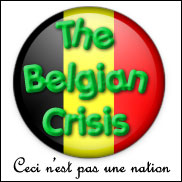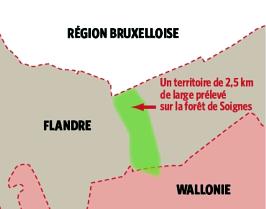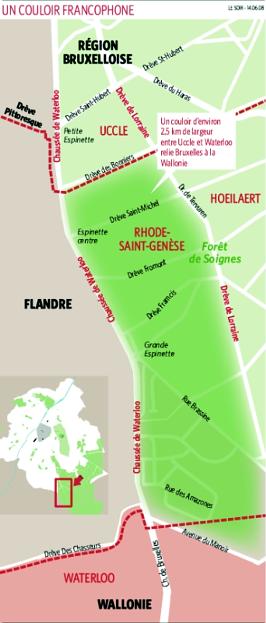Political Crisis in Belgium Deepens
From the desk of Paul Belien on Thu, 2008-06-26 13:44

Belgium is slowly unravelling, like a Yugoslavia in slow motion. The supranational country is in a situation of political limbo since the elections of June 10, 2007. Belgium, which is often described as a miniature version of the European Union with which it shares its capital, is made up of Dutch-speaking Flanders in the north and French-speaking Wallonia in the south. Politicians in Wallonia are preparing for the moment when Flanders secedes from Belgium. Some Flemings fear that French-speaking extremists are planning to take over the Flemish towns surrounding Brussels by force.
Since its conception in 1830-31 when Walloon and French revolutionaries tore the country away from the Netherlands, its French-speaking minority has dominated the Dutch-speaking majority, which was denied higher education in its own language until the 1930s. As a result the linguistic frontier gradually shifted northwards, as historically Dutch-speaking towns and villages, such as Waterloo, were annexed by Wallonia, and as Belgium’s capital, Brussels, originally a Dutch town, developed into a bilingual enclave within Flanders.
This process was exacerbated since the 1970s when the massive influx of North-African immigrants, from formerly French colonies, turned Brussels into a predominantly French-speaking city. The influx of immigrants in turn drove the French-speaking Brussels middle and upper classes out of the city and into the surrounding Flemish countryside, the Halle-Vilvoorde region, where the newcomers demanded that the “peasants” address them in French. The Belgian authorities introduced a special status – the “facility” regime – for a number of Flemish municipalities surrounding Brussels: To welcome the newcomers and make it easy (facile in French) for them to adapt to their new environment they were allowed to use the French language in their contacts with the local authorities. In fact, this meant that Brussels’ bilingual status was extended into Flanders.
The June 10, 2007 elections were a clear signal that the Flemings have had enough. They want newcomers, whether these be Walloons or immigrants, to respect the Dutch identity of Flanders. This demand for respect on the part of the Flemish as well as the refusal of the French-speaking Belgians to renounce their “acquired rights” have led to a political stalemate. For six months it was impossible to form a government, then an “interim government” was formed, and after that a “real” government which, however, quarrels on all issues and has not been able to agree on policies. The result is that legislative work in Belgium has come to an almost complete standstill. The stalemate has led to a hardening of the positions, with a majority of the Flemings declaring in opinion polls that they favour Flemish independence if Belgium proves to be no longer viable.
 Both Flemings and Walloons are now preparing for the post-Belgium age . Since Brussels is geographically an enclave within Flanders, Walloon politicians are demanding a territorial corridor linking Brussels to Wallonia so as to ensure that, if Belgium falls apart, Brussels and Wallonia can form a connected “Wallobrux” union. The corridor, a piece of land 2.5 kms wide, stretches from Brussels to Waterloo.
Both Flemings and Walloons are now preparing for the post-Belgium age . Since Brussels is geographically an enclave within Flanders, Walloon politicians are demanding a territorial corridor linking Brussels to Wallonia so as to ensure that, if Belgium falls apart, Brussels and Wallonia can form a connected “Wallobrux” union. The corridor, a piece of land 2.5 kms wide, stretches from Brussels to Waterloo.
The Flemings, on the other hand, demand that people who apply for social housing in Flemish towns such as Vilvoorde, have a command of the Dutch language – a demand which the authorities say is discriminatory and in violation of European Union laws.
Flemings living in the region around Brussels fear that the French-speakers are preparing to occupy parts of Flanders, i.e. the corridor linking Brussels to Wallonia and the municipalities with a “facility” regime, by force. Steven Erlanger, the biased pro-French Paris correspondent of the New York Times, recently wrote that the Flemish demand for respect towards the Dutch identity of Flanders is an example of “nonviolent fascism.” If there is going to be violence the aggressors will not be the so-called “fascists.” On Tuesday evening Bart De Valck, a teacher in Wemmel, a Flemish town to the north of Brussels with a “facility” regime, told a meeting of Flemish secessionists in Antwerp that he fears the split-up of Belgium “will not be peaceful like Czechoslovakia’s.” De Valck, who is the spokesman of the Taal Aktie Komitee (TAK), a group of young activists who defend the Flemish character of Flemish towns along the linguistic border, said that French-speaking extremists are planning attacks on Flemish leaders. “We receive threats all the time.”
Meanwhile, there are persistent rumours that the health of King Albert II, the 74-year old monarch of the Belgians, is deteriorating. The Belgian royal family has always allied itself with the French-speaking minority in the country. Albert’s likely successor, Crown Prince Philippe, however, is an even more outspoken enemy of Flemish independence than his father. In November 2004, during a visit to China, the Crown Prince told the Belgian press that people who are opposed to Belgium and favour Flemish independence “will have to deal with me. Make no mistake: if necessary I can be tough.”

referendum
Submitted by qwerty123 on Mon, 2008-06-30 09:42.
Akira,
Why not solve this with a referendum on Belgium and its continued existance? Afterwards, people can decide if they want to be part of francoland, dutchland or wherever with further referendum.
I am concerned that people don't have a say in what happens in Belgium, or in other countries: The politicions decide. Referendums remove the politicions from the equation. I think that the more referendums there are held then the less control they [politions] think have. Perhaps, more could be achieved?
I don't have brillient ideas. Have you?
Brabant
Submitted by qwerty123 on Fri, 2008-06-27 11:19.
"Since Brussels is geographically an enclave within Flanders, Walloon politicians are demanding a territorial corridor linking Brussels to Wallonia so as to ensure that, if Belgium falls apart, Brussels and Wallonia can form a connected “Wallobrux” union"
Brussel was connected to Wallonia by Brabant. However, for some silly reason some daft polition decided to split it along linguistic lines and now we have Flemish-Brabant and Brabant Wallon. It was there before, taken away in a move that fuled more animosity and would like to be put back the way it was. Instead of splitting the country based on language why not unite the peoples. It would have been nice if the politions actually asked the Belgians what they wanted but as ever they won't. Notice the huge increase in the number of *Belgium* flags that were flown during the last loss of a functioning government. Please don't paint historical events in your own selective mosaic.
http://en.wikipedia.org/wiki/Walloon_Brabant
"Walloon Brabant was created in 1995 when the former province of Brabant was split into three parts: two new provinces, Walloon Brabant and Flemish Brabant; and the Brussels Capital Region, which no longer belongs to any province. The split was made to accommodate the federalization of Belgium in three regions (Flanders, Wallonia and Brussels)."
You depiction of a “facility” regime is perverse. These are facilty communes that in this case provide facilities in the French language. Brussel can be expensive and people move out into the countryside and commute in. This is not a problem elsewhere in the EU: The Luxembourgers living in the Province (of the same name) in Belgium and the many Gibralarians, British, French, Belgians, Romanians and other nationalities who work in Gibraltar and live in Spain.
Something that never ceases to amaze me it that most Belgians think that, if the country were to come to a close, then it would be split into two and one party would get Brussel. I think a more likely outcome would be that it would be split into four countries : Brussel, Wallonia, Flanders & Belgium. Bruxelles would be unwilling to loose the aeroport, so it is probable that Zavantum would be incorporated into the new country of Brussels along with the current facility communces. These would be bilingual. The Flemish national aeroport would continue to be in Antwerpen, which would make sence because it is the capital of Flanders. The German speaking province/area would opt to create a fourth country called Belgium, drink bier and eat chips ;P
Divide and concur.
Here we go again .
Submitted by THE DOCTOR on Thu, 2008-06-26 18:24.
To my Flemish comrades , book me a place at the southern end of the proposed corridor opposite Waterloo , there has got to be a Brit there . If the Frogs want Waterloo II , I am sure that there will be enough friends of Flanders available .
The death (once more) of multiculturalism
Submitted by ribera on Thu, 2008-06-26 11:16.
It seems to me very significant that it is in Brussels, the city of European Union authorities, which pretend to end
with european nations sovereignity and identity, where the multicultural and multiethnic idea is the more
threatened at the moment.
Excellent backgrounder Mr.
Submitted by Amsterdamsky on Thu, 2008-06-26 10:18.
Excellent backgrounder Mr. Belien. Thank you.